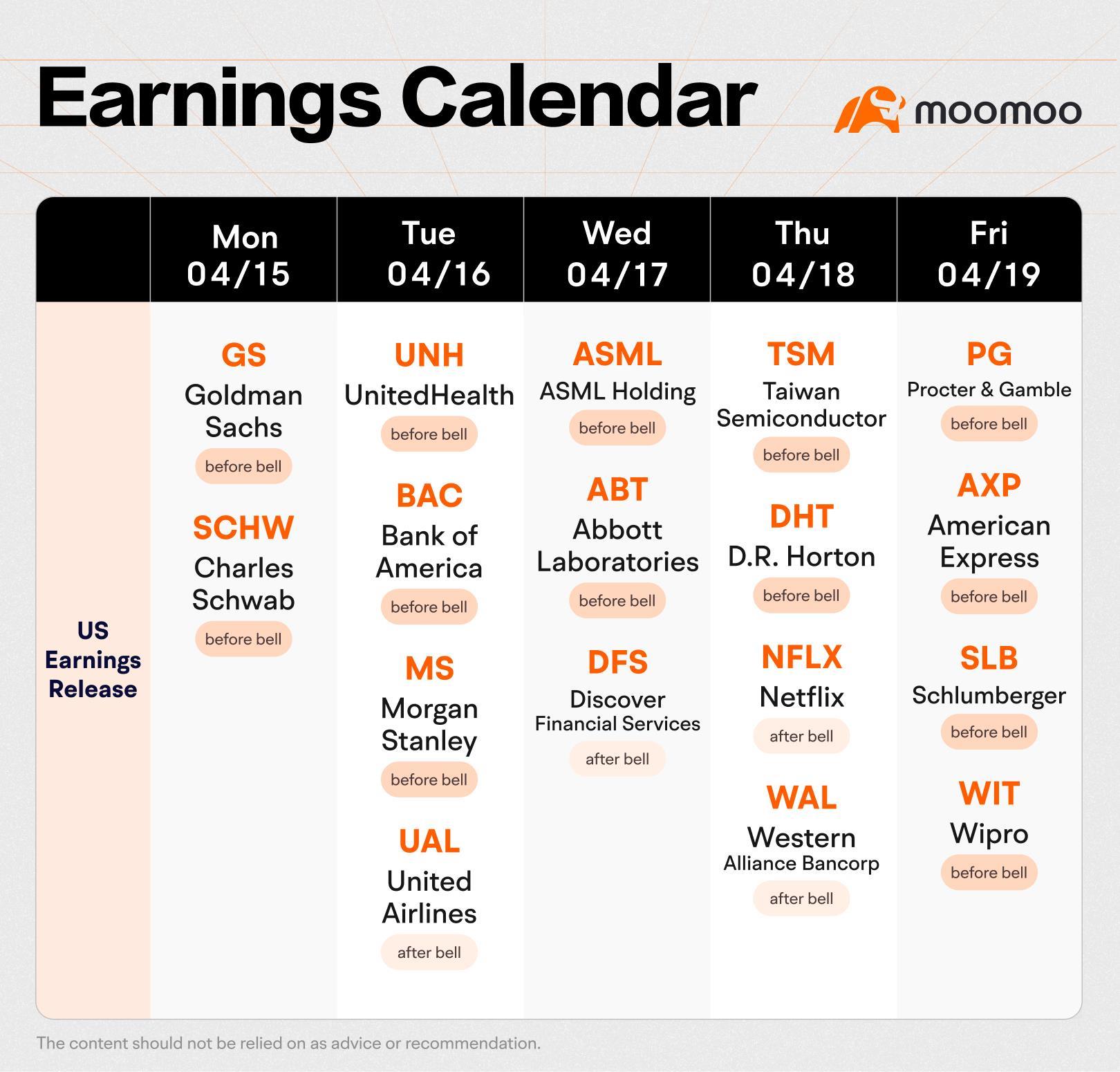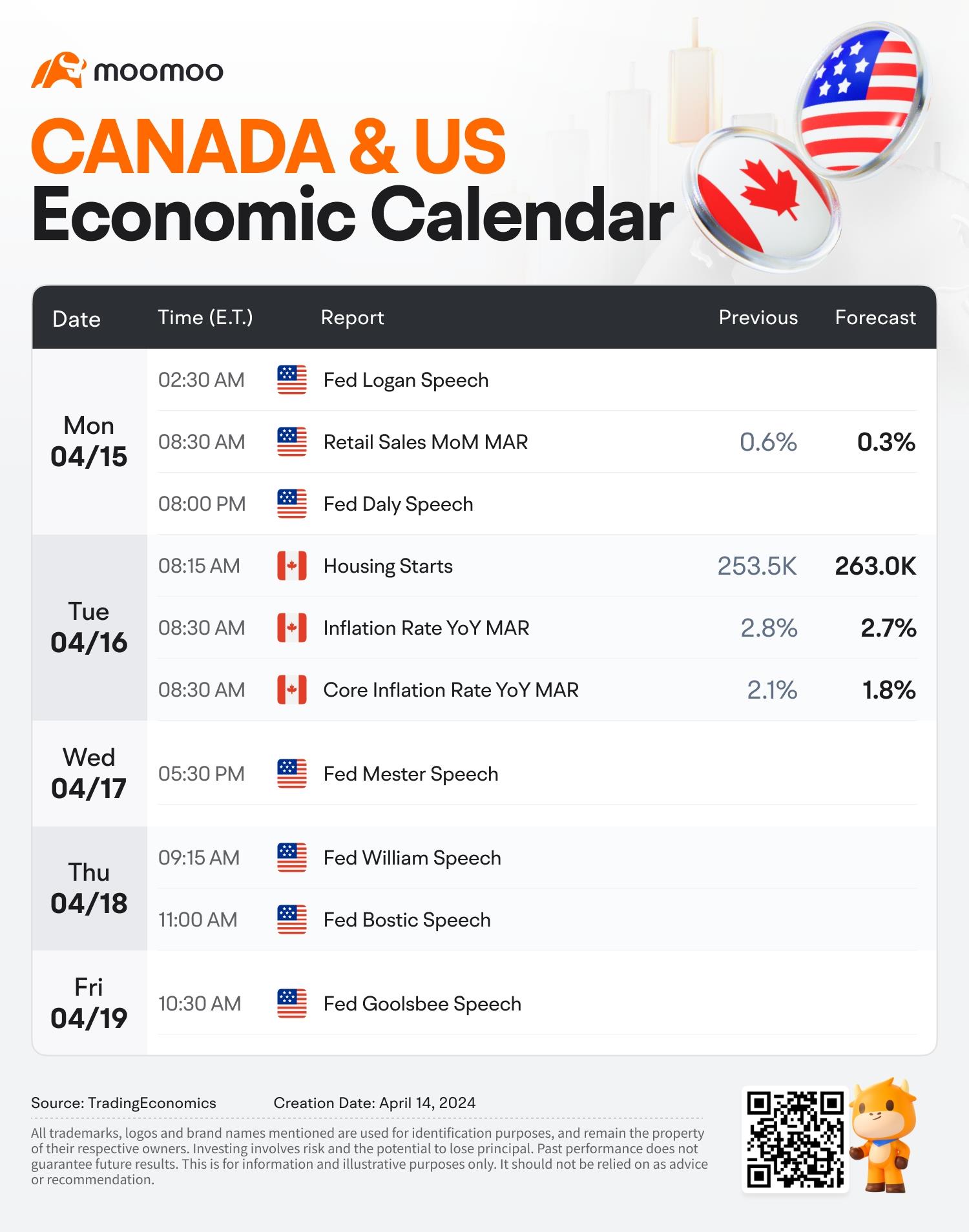The Week Ahead (Banks and Netflix Earnings; Canada March Inflation Rate)

Following last week's flurry of macroeconomic news, this week's focus shifts back to company matters. The US is where most of the main corporate action is taking place, with banks such as $高盛(GS.US)$,$美国银行(BAC.US)$, and$摩根士丹利(MS.US)$, as well as $奈飞(NFLX.US)$, emerging as standout performers as the quarterly earnings season kicks off again.
The Bank of Canada will be focused on the March Canadian consumer price index report next Tuesday after another upward surprise in U.S. price growth created doubt about the U.S. Federal Reserve’s rate-cutting plans this year.
This week, global markets are keenly attuned to fluctuations in commodities prices, with geopolitical tensions taking center stage. Iran launched a wave of over 200 drones and cruise and ballistic missiles toward Israel, setting up a direct military confrontation between the two nations and raising the risks of wider regional war.
Earnings Preview

The US corporate earnings season kicks into high gear in the week ahead. Investors are expecting this first-quarter earnings season will show which businesses are able to continue withstanding higher pricing pressures, as well as the upcoming refinancing cycle. Results from major banks Bank of America, Goldman Sachs, and Morgan Stanley will likely take on greater significance for investors given JPMorgan's disappointing net interest income guidance this week. Overall, analysts expect S&P 500 companies to have grown earnings by more than 3% from the year-earlier period, FactSet data shows. If that's the case, it will mark the third straight quarter of earnings growth for the benchmark.

Slower price growth in Canada in recent months and a sharply underperforming Canadian economy have "increased confidence" among BoC policymakers that inflation will continue to slow. But the central bank wants to see more evidence before shifting to interest rate cuts.
RBC expects year-over-year price growth in March to tick higher to 3% from 2.8% in February largely due to higher gasoline prices pushing energy costs further above year-ago levels. Food price growth should be little changed—still above 3% but slower than the 10% plus peak increases in late 2022.
The CPI data is often volatile and clothing prices, in particular, could rebound in the spring after milder-than-usual temperatures slowed demand and prices over the winter. The BoC will be more focused on its preferred list of core measures—which are designed to look through volatility in any one subcomponent—for signs that broader inflation pressures continue to ease. RBC looks for growth in the BoC's preferred trim and median measures to hold close to the February pace both on a year-over-year and three-month rolling average basis. The latter slowed to a 2.2% average annualized rate in February.
In US, how corporate America is handling sticky inflation and the prospect of higher interest rates will be top of mind for investors in the week ahead, after this week's choppy moves. The bull market is on edge. The Dow Jones Industrial Average and $标普500指数(.SPX.US)$registered their second straight losing week after a hotter-than-anticipated March consumer price index report weighed on the interest rate outlook for investors. Markets are now pricing in two rate cuts starting in September, CME FedWatch Tool shows, instead of the three rate cuts starting in June investors held in their base case prior to the CPI report.
Source: Tradingeconomics, RBC Economics
Disclaimer: Moomoo Technologies Inc. is providing this content for information and educational use only.
Read more
Comment
Sign in to post a comment
